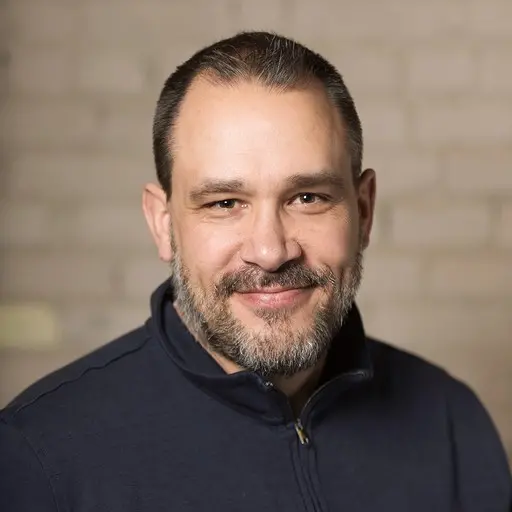Hear from Lutz Beck, CIO of Daimler Truck North America, as he joins Jake Trippel, Executive Consultant at Vervint, to discuss navigating business dynamics driven by AI innovation, agility, and evolving leadership roles.
We’ll dive into current challenges with the speed of business, prioritizing people and essential skills, embracing automation and data, and the CIO’s role in achieving an adaptive and innovative future.
Tune in now for recommendations on starting your journey to automation and AI.
Enjoy!
Featured Guests:
Episode Transcript
Danielle Haskins: Hello and welcome to today’s episode of 10,000 feet, the Vervint podcast. I’m your host, Danielle Haskins. Our conversation today will focus on AI, the role of the CIO, and current challenges with today’s speed of business.
I’m joined by Lutz Beck and Jake Trippel.
Lutz is a senior executive with deep experience managing mission critical and complex digital transformations and is the Chief Information Officer for Daimler Trucks North America.
Jake is an executive consultant at Vervint, as well as the Dean of the College of Business and Technology at Concordia University, Saint Paul. And he will be facilitating today’s conversation with Lutz.
Welcome to you both.
Jake Trippel: Thank you, Danielle. Lutz, it’s good to see you again.
Lutz Beck: Yeah, thank you for inviting me. Thanks.
View Full Transcript
Jake: Again, it’s awesome to have you, and Lutz actually I want to start, I want to go back to the past as we, you and I talked about the present and the future real quick. And as I was looking at some of the things that you have published before, I one thing really struck out at me. Which was you published in 2019 that the article called Building the Intelligent Company. And back then you were already concepting the designs and foundations of what you’re doing at Daimler Truck today, which also includes AI, as well as IoT and autonomous driving and all the fun things. Talk about the role that AI is playing and what you have envisioned I’d have to imagine back then, but talk about how the role that’s playing in your plans today.
Lutz: I mean, look, I mean as you as you mentioned, right, 2019, right, it’s five years, almost five years back, right? Some people would say they were ahead of their time, but I would say no, I was not because I mean at the end of the conceptually in technology wise AI was already at that point of time some kind of a topic, right? It was nothing new, so it’s nothing new now. Of course it’s coming a bit more to the forefront.
People have it a bit more because it’s some kind of fashion to talk about these topics, right. But at the end of the day, everything what we have there from a technology point of view was already existing five years back, right. As it was, big data was also not coming just in the 2000, whatever 10 or later as it was before already there. So there is a lot of topic where we have there. So for me data in particular is playing a big role in companies more and more, right. And with the technology we have on hand now, we could actually, we can actually leverage much more what is happening and we could, we can also bring new services, new solutions based on data we can look for efficiencies, we can change our working model right. At the end of the day, what AI is enabling us is basically to relearn the way we do things in a completely different manner. Automate topics in where we always had some problems in automation or helping us also to basically, I would not say be more efficient, right?
Everybody goes on this productivity topic all the time, but I do believe you know, when I look at it, AI is helping us to get non value adding topics out of the equation, so that we can use resources for some other topics and it’s helping us in a lot of terms also to do things in a completely different way than we did it before. So, for us it’s a big topic of course. I mean in terms of, because you talked about it, autonomous driving it was always a topic, right? It was already used in a lot of ways, but when you look at the personal impact of AI, it’s something which is helping you because everybody has, in a certain way, ChatGPT or whatever and uses it now, right? I never got so much of eloquent writing in my inbox, right because most of the people are using that now to write everything at the end of the day it’s cool and it’s nice. But for business purposes, it’s a huge topic because it’s helping us really to reorganize and arrange the processes in a completely different way and with the help of AI do some arrangements which were never thinkable before.
Jake: And Lutz, as you talk about that. That four or five year journey as you mentioned now right, it’s just 2019 probably seems like yesterday, but as you picture that journey, if you wouldn’t mind without, you know, divulging proprietary emails like that, but what are some of the biggest barriers that you came across along your journey towards automation and AI as you were building this intelligent organization?
Lutz: I mean the biggest barrier from my point of view is actually the people itself, right. As much as we like to, you know, play around with technologies and as much as everybody is now keen to, let’s say, use ChatGPT now, because you were referring to it right, 2019, I was talking about building the intelligent company, where the data is the key asset and where you have some kind of a data-driven culture.
Now you know just by using AI we don’t have by far data-driven culture. And this is for me the biggest roadblock that I say, how we’re using, how we’re applying, how we can really make 100% use of every technology which is coming along the way is something which sits up here in the mindset, right? We took, just imagine we took five years, four years, to bring the people to a point where in a big data environment they’re not more just talking about the technology. They’re talking really about what can I do with the data. I do understand the data. I know the content of the data and I know exactly what to do. So the biggest roadblock are the people, right, the people and their thinking, their mindset towards the topic, right. Because if you look at it now, as I said, it’s a password, right? AI is a big password. Now if you come along and have another password mid 2024, right, everybody will focus on something else and everything is forgotten.
So for me, the biggest topic is actually working on a data-driven culture where data is a key part of our daily thinking and what are we doing, what can we do with it and how can we improve and how can we learn from it. And AI, the technology is helping us now to make it more transparent, to bring that to the forefront and help the forefront and helping really to push that forward. But, do I say we are already having a data-driven culture? In a sense yes, but in the sense I would like to have it by far not, right.
And I think this is the biggest portion for me that I see this roadblock because I mean you know technology was in the past always a bit of a roadblock because there was a certain technology coming, and then you needed to wait for other elements. But the developments on technology side are so fast in the meanwhile, so that we have to learn how we can also have the speed which is coming from a technology development also inside of an enterprise and make it accessible for everyone.
Jake: I have at least 600 questions for you on speed and cultural transformation, but I want to go back a little bit as we talk about people, if you wouldn’t mind. Is there any, as you look at even five years ago or look at even your career, what is your view as you talk about people? What are like the most desirable skill sets in your world that you’re after today? Like if you were to talk to an undergraduate just starting their education at university, or if you’re talking to a professional who’s mid career, you know, focused on what are the skill sets I need to have to succeed and to thrive in this AI era. What would Lutz Beck say? What are the skill sets of the future? What do you want folks walking into your organization to have?
Lutz: Now let me start, let me start with not a technical skill set. What I would like to have is people who are having a personality, who know what they want to achieve, who are able to learn, who adapt, who are willing to learn every single day something new, and who do not think that with the college everything is done, right. So who are really adaptable to everything, what is there. Of course now you were asking because of the technology skills, right? Of course it would be beneficial to have data analysts, data scientists with all the skill sets which you need for that, right in terms of programming languages, in terms of analytical skills, all of that, you know. But due to the fact that the technology is changing so fast, you have some basic topics which you have in terms of programming languages and whatever, but everything else is changing so fast. So what you need is people who are actually fast thinkers, who can learn and who adapt very fast. And from my point of view, who have also a feeling for the business, who are willing to learn the business and understand the business and the process and want to learn it holistically, not, don’t get me wrong now it’s not a, you know, just looking at technologies and say “oh I want to focus on this technology.”
Lutz: You need also in a certain sense, but, in order to really deliver value you need to open up and you need to have a broader view and a holistic view on a lot of things. So you need to bring the technology skills by far, of course, yes, but you need to be willing really to learn business. And the business language because these people who are working on the data and the AI topics are the key people to change the companies processes and change a companies working model. Now in order to do that you need to understand also what is there because you need to come up with ideas based on data or on other elements. Where you say we can do certain things different or we can look into that with this kind of technology. And that’s exactly what I’m looking for. And in order to do that, you need people who have a certain personality and bringing this curiosity with them, right. And also say, hey, you know what? Here I have something which we can use. Let’s do that, let’s try out, let’s be innovative. Let’s make that happening, right?
I mean, the thing is, look, I mean technology you can learn and I learned over my career I learned a lot of technologies and I did which I didn’t have in the university. But the topic is more the personality. Also in light of if you look at it right, I mean, when you look at the skill sets which are needed nowadays, right, on the technology front, we all know that we have a shortage on it, right? We do know that there is a big shortage on that. Now can we bring that all back? No, we are not able right. We will not be able to get that all rolling. So there is, I have a study, I think that we have a number of job posting that most of the skills that we have, less than half of the people are actually available. Now what you’ll need to look at is that you get people who are curious, who are willing to learn and do certain things, and coming out of different areas. It doesn’t necessarily need to just to be the technical skills, right?
I have a lot of people now coming also from a business areas. Going more into that, because everybody is basically equipped nowadays with a lot of base technical skills, right? And this is something we are using currently, I mean, you need to have the base programming languages which are currently running you need to have the analytical skills, certain things. I mean this is all there. But I do believe because you know I learned old programming languages. Yeah, I was not doing COBOL, don’t get me wrong, but I was doing a lot of other things which were coming after, right. And you know, this was still, I think, a huge task to learn if you were not dedicated and focused on it. But if I look today, if you look at Python or if you look at other programming languages, right.
For me, it’s so easy, right? You can learn and you can do online courses. You can learn that easily. And this is exactly where I think of when people do not have the necessary skills I’m happy that we that we do and bring them up to the skill level we need because we know the shortage. On the other side, I would be delighted also if I can just go to a college or whatever and say, hey, there is exactly the amount of people I need for it. And what we also do and that’s the reason why I say that, we also use what we call citizen technologists. We’re using more and more people out of the business for specific topics as well because when you look at AI components, everybody’s using now, ChatGPT, we have copilots on our Microsoft environment. So, people can do that. They are easily able to do. Now of course we need to build them more up, but I’m happy to use more and more of these people also for some kind of not deep technology topics, but more on the process side.
And this is the thing where we look, so we look in all of the area. You look at the deep technology area where you have the skills where you need to have this deep knowledge. And then you go up slowly in the level of technology skills which is then adding more business skills and exactly this combination of it. If I would find somebody who is having all of these skills, I would pay the person a lot of money because this is rare skills which you have, and it’s difficult but I do believe the combination of it is making it. And as we move from an IT point of view, look at the CIOs, the CIOs were deeply technologists in the past, right. Now, when you look at now, you need people with the business understanding because this is how you can drive and how you apply the technologies in the future, right?
Jake: Thank you for that. And you’re covering such awesome domains of what I hear from executive leaders around the world and countless industries, and we’ve covered already some broad domains as we’ve talked about, AI across strategy and technology. I would like for, if you don’t mind, I want to hop to experience real quick in this regard. Because I see, also from your posting that you have a passion for AR and VR, especially recently in the last year. Talk about how, either in the form of AI or how you’re using data to help drive those experiences to Daimler customers.
Lutz: I mean, look, I mean a simple example is where you can apply that if you look at configurations of a truck right, we’re basically doing a VR, AR experience for configuration now. You have a lot of specs or configurations in your environment, in your systems, right? Now based on, and we have connected trucks where we get a lot of information as well now, you could right, potentially put that all together and then you could say hey what is the best configuration based on a certain usage pattern, right. And this you can feed back into configuration in this backing and then you get the best out of it because you can also say look, this is the reason why it’s the best these options needed to be. So there is a lot what is going back into the normal processes and which is helping us quite significantly, to improve the efficiency and improve what we can deliver to our customers and to our dealers.
Jake: Apple as you, as you already know, is about to launch I don’t know what many are kind of coining the era of spatial computing, or where many are arguing that maybe someone is finally getting AR and VR rights, as many have tried, right? And Apple, as always with their strategy, right, they wait, they’re like a shark under the water, just waiting patiently until they think that they have it. And we’ll have to see, right? But how, talk to me about your thoughts on spatial computing as we talk about this coming era and your thoughts on those types of experiences for Daimler customers.
Lutz: It’s funny that you mentioned that because you know what? I had a discussion about spatial web I would say before the pandemic hit us. So, end 2019 beginning 2020, I talked with a startup regarding spatial web, and how you can do, how you can basically augment the reality into a spatial web, right, and how you can do it. And we were, I mean, we were having discussions, a huge case could be a warehouse, right? If you want to have a warehouse, and you have a real time simulation you could use that for instance, right? But I would rather see that also for traffic, right, when you look at traffic for a big city, and if you look at smart cities, just imagine you augment everything into a spatial web, and you can do real time feeds.
And that, I mean, just talk about future now, just imagine you have a smart city. You go from the highway into the smart city because we have a lot of, we have only autonomous cars, right, or trucks. You basically hand over the steering from the point you leave the highway, and you give it to someone who is with the spatial web with the augmentation of everything, leading you through to your target in the shortest possible time or with the shortest way, whatever you’re choosing right? I mean we talked about it four years, three years back, and I hope that it is coming because it will make certain elements much more efficient, and a good use would be actually warehouses. So that you basically go, and we talked about it in the pandemic because, what we wanted to do in the warehouse is actually avoid that people meet them in between so that you have the routing in the warehouse and the routing is done actually in the special web, and then it feeds real time down to the people working in the warehouse, right. But it was a conceptual stage, we never realized it in a certain sense, but I’m still in contact with this startup and looking into what they’re doing. But I think it was for me it’s a cool element and we certainly will come to that and using that more and more.
Jake: Thank you for that. And as we highlight this incredible future that I’m equally as excited about, I know many are, others ultra paranoid about it, but you from a Chief Information Officer perspective for Daimler Trucking North America. When we look at this future of quantitative data sets and qualitative data sets in a variety of different forms, right. Through a virtual world, through all your systems, through your IoT initiatives and whatnot. From a CIO perspective, talk to me about your architecture and infrastructure of the future, and talk to me about how you’re looking at that, either from a competitive advantage standpoint or to set you up for further AI advancements, you know, etcetera, there’s so many different ways we can go there. But talk to me about, as we paint this just, oh my goodness, this firehose of data coming at you at all times, tell me more about that from your lense.
Lutz: It’s exciting and overwhelming in one term, right, because exciting about all the possibilities you have with data. It doesn’t matter what it is, right, exciting how you do it. Overwhelming in the sense of we don’t know exactly how to handle it at the moment, right, because people are used to generating a lot of data. And now they learn okay, what is the, let’s say importance of data. So what is the important data, what is the less valuable data, right, because you need to bring that in. Then you have the governance rules around it, right? I just recently was reading about the AI regulations, which are coming now here in the US as well, right? So, but for me, you know, I talk also with companies now on quantum computing because I know exactly that in my current infrastructure cannot handle all the things what I want to do, right. So I need to make sure that I get this rolling as well, and that I’m looking into what does that mean for my infrastructure? Because you were asking about it, right? Because I know what the current infrastructure might not enable me to do all what I want to do.
The second thing is but I need to create all this governance rules or this regulations around it as well to make sure okay what is it? And then you need the skills of the people to say, okay and what are the valuable topics for us, what are the most important topics for us. Because you can easily go into all the different directions, but maybe 70% of it is not valuable at a certain point, right, might be valuable later on, but not now. So and this is what we need to look at. I mean I’m totally excited about the possibility we can do, I’m totally excited about the technology. I’m happy that technology is changing, but as we have it, you know, I mean we see it now with the regulations about AI. We had a discussion within the company already about data ethics, right? Because this is also something what you have to do. So, the field is enormous, right, there is so much of possibility. And I would like to run every day just to my time talking about these topics, but unfortunately, I have some other topics around that as well. But no, I think you know, as I mentioned before the technology gives us a lot of possibilities, but if you just talk about quantum computing right, there is still a lot of unknowns. There is still a lot of what we need to learn.
On the other side, I know exactly when I’m using data in this enormous volume, I actually cannot do it with my topics, which I have today. So I need to find another technology to help me there. So and this is where we always looking for, and you need basically what you need to do, in my position, I need to look already what I’m implementing today needs to be fulfilling my needs in five to 10 years, which is very difficult. Maybe five years is a better thing. So if I implementing something today, it should at least hold 2029, 2030, it should be there, right. And something it needs to be there that I say, hey, can I still do my business there because with all the changes you are triggering with everything, what you are doing, it’s going so fast. Now you need to create something which is so flexible, either you have a base which is really solid, where you know exactly this will evolve to something which is helping you. But this is very difficult to say, so you need to create something which is so flexible and adaptable in terms of a back end which we never had before because we were building backends. If you look at the time right, we have the big platforms, we have the ERP systems, they’re all built to last for long, right.
Now in the data space, everything needs to be built and we shouldn’t look that much on the back end all the time because technology will evolve. We need to look into that, but it needs to be adaptable. We need actually looking in the front and the huge cases. In everything what we’re doing with AI, with everything that we have, because there is the value, and not in the technology which we have in the back and front.
Jake: You and I can blow the crowd away, and maybe in a future call we can talk about qubits, some other time, we talk about quantum computing, but, as we look at today, as we talked about, and thank you for mentioning quantum computing, is high performance compute the bridge? Kind of as we look at Daimler’s needs is high performance compute, kind of the focus for the coming years until we get to quantum computing?
Lutz: I don’t know yet. It’s a unknown for me. I’m open with that one and it’s unknown. We are looking into it. I have very interesting discussions on it, and it looks like that it can help. Is it the solution? I’m not sure. Maybe tomorrow there is something else coming around the corner which is giving us a complete different way. But I mean, at the end of the day as you said, right, we’re producing that kind of volume of data. And what we need to learn, this is also a big topic for me, right? What we need to learn also is the differentiation between valuable data and non-valuable data. Because everything what is non valuable we actually need to start deleting because it’s not, you know if there is regulations around of course you keep it, but at the end of the day, everything else, why do you need to keep data for 10 years, for 15 years if you don’t see value. Yeah, you shouldn’t do that, right, there is no need. Because at the end of the day, otherwise, you know, we’re sitting on more and more and more and more data. And then it’s more and more difficult also for people to actually say, is that valuable or not valuable. So, I think this portion of the data environment is a very big one as well for me to say hey, let’s look into that, and let’s make sure that we are not sitting on data which is non-valuable.
Jake: Thank you for that. And Lutz, with your extensive experience along this journey so far as we talk about intelligent organizations and rapid data-driven organizations, which as I view, when I talk to leaders everywhere, the path that people are on, they’re just at different stages of their journey. What would Lutz Beck recommend to an organization who’s just beginning its journey down the road towards automation and AI? What would Lutz Beck recommend to them right now? Taking a vacation is not an answer, we have to wait.
Lutz: Yeah, yeah, I know. Be open, be innovative, be adventurous, be risk taker. You might not succeed in the first step, right, you might have some fails, which is a normal thing, right, at the end of the day. But, there is no time to wait for that, because for me this is the win or lose game here in terms of data, right? You need to be in that topic, you need to understand the topic. Of course, you need to have the right set up.
This is a different thing, but you need to start with it, and you need to look into what is your big topic on data? What can you deliver as additional value out of data which is close to what you’re doing and how you can work on that one. So, start it. Start it as much as you can with everything you have around at the moment. Go in there, look at it, learn from examples, right? I mean, there is a lot of companies out there who supposedly lead the way in terms of data, right? So look at all of them, but don’t try to copy them. Find your own way because every company is a bit different, right. So find your own way and find the technologies you want to set on, right. I mean, look there is a big topic, right, we started here 5, 6, 7 years back, right, with the big topic on data analytics, with the cloud, and all that kind of stuff, right? It was basically because I said I want to have it, right. Was that foreseen in the way it is now, that we do all the topics and have AI cases, whatever? No, it wasn’t, right. But we started off and we looked at it. We looked at some quick wins because you need to showcase also that there is something valuable. But start. Start and try to do whatever you’re able to do, right, and get all the learnings in. Get some people who actually are not within the boundaries you have in the organization, who tries something different, who wants to make a difference, right. And then start it.
This is, I mean, I cannot imagine that nobody is in this data game. I think that companies are completely out of that. I have a hard time to believe that this is still the case because I think everything what you do in terms of business, also when you create services around your business models, right? This is all based on data, so you need to do something, right. There is nothing which is saying hey, wait another 10 years and then you will be, you will know what is there and you can copy it. This doesn’t work.
Jake: And for companies, Lutz, that are behind, which I’ve met many unfortunately, right. And there’s a lot, there’s a variety. I’m not saying that as a criticism, there’s a variety of reasons why. Sometimes it’s regulatory, sometimes it’s like you said, they just don’t hit the delete button ever. But what are the, if you could pick, let’s say 3 foundational things that a company has to have to start its journey, what would you recommend?
Lutz: You need the technology back end where you can run everything right? You need to have something in place where you make sure that this is some kind of running. You need a creative team with the right skill sets, which is willing to go on this journey, which is, as I said, taking a risk also and really doing that. And you need a lot of communication skills because you need to sell that. You need to sell the story of it, and you need to make sure that everybody understands what you are doing there. Because, I mean, look, we had, as I said, we started a journey a long time back. We have every year at a so-called the DTNA data day. And we’re, you know, at the first data days we were talking about technology, we were talking about visualization tools and all that kind of stuff. And now we’re talking about culture, mindset, service thinking, right? So, we’re already over this, but at the end of the day, if you do not have it as a company, hire someone who is having the passion for it, and who is having the understanding of it, and who knows how to do that. Hire somebody who is really willing and give this person or this team a freedom also to operate and make sure that they are able, even if they fail at the beginning, continue and hold on, yeah. Because I think it’s so important to get this rolling, so you need to have this enthusiasm, this passion for it, right. And if you don’t have it in the company, try to hire it.
Jake: And finally, talk about what is, or how will the CIO role change in the era of artificial intelligence.
Lutz: I think, you know, the CIO role was changing already over the last couple of years, significantly, if I want to call that. It was more on a very technology focused, more on a business-oriented focus. And I do see actually, the CIO is, for me, the biggest change agent in an organization. Because everything what you do today, every business model, it doesn’t matter, is actually based on technology. Now what you need to do as a CIO, you need to lead the company into the next era. You need to lead the company into the next chapter because there is so much of things you can change with technology.
And AI is one component of it which is helping us actually.
The good thing on AI is because we have a lot of huge cases there, you know, that you can showcase. You can showcase more and more the development and the progress. But at the end of the day, for me, the CIO, the biggest topic is, it’s some kind of a change agent. It’s a strategic advisor because he is having the outlook, you know, a CIO needs to have the outlook for the next 10 years, 15 years. We need to look at it, right.
We need to also make sure that the CIO understands the business because we can, with technology, enable new business models, we can create new revenue streams. All this is also, so you need to have a bit of an understanding of everything, and you need to make sure that you get that communicated. So, we were talking about communication. The CIO needs to be a big communicator and if you look at the past, IT was a bit hidden, right? I mean mostly somewhere in a, you know, and we need to go in front. We need to talk. We need to look at it. We need to get the ideas created. We need to help say, hey, this technology can give to you. And AI is a brilliant example for a lot of the topics which we can create new, right.
So, for me, it’s just like you steer a lot of new business, you steer new revenue models, and you need to basically learn that because you are part of that one. So you are able also as an IT locally across an enterprise, and this is what we need to look at. So the CIO is a key element for me, and I think there are a lot of companies out there, they understand now the value of IT. Now you need also a CIO who understands the value as well, and understands also the business and is able to drive the enterprise in the future, right. And this is something which is changing significantly what we had in the past.
Jake: Lutz it’s been awesome to see you again and talk to you, and I appreciate all your perspectives. Like I said, I wish we could go longer, but I really enjoyed my time with you today.
Danielle: Lutz, thank you so much for sharing your insights with us today.
Lutz: Yeah. Thank you. You’re welcome.
Danielle: For more information go to vervint.com.







